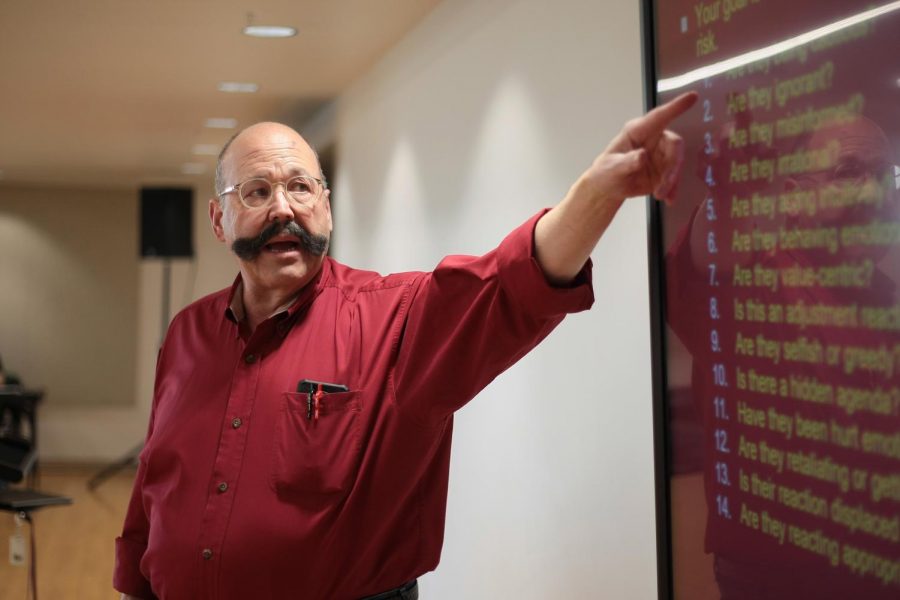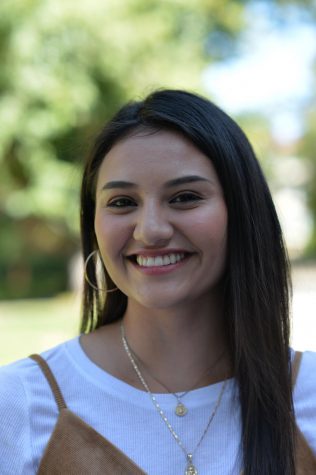Bias Advisory Response Team holds training
Session advises students to report situations they feel threatened, unsafe
BEN SCHUH | THE DAILY EVERGREEN
Charlie Powell, public information officer for the college of veterinary medicine, says it is important to strengthen peers who might be affected by certain situations during a training held Tuesday afternoon at the Chinook.
March 27, 2019
The Bias Advisory Response Team organized a de-escalation training to help students navigate tense situations in public spaces.
Sgt. Dawn Daniels, of the WSU Police Department, said she helped organize the session, which is the first for students.
“We are starting to see more programs that are controversial, and we think this would help students navigate through these kinds of situations in school and in life,” Daniels said.
Charlie Powell, public information officer for the college of veterinary medicine, spoke about how to observe for critical signs of possible violent situations and how to be better equipped in managing those situations.
Powell said the session was held to address the WSU College Republicans’ plan to build a replica of the proposed border wall between the U.S. and Mexico, as well as other events on campus that could attract a crowd.
“The best skill is to not engage,” he said, “discipline yourself. You won’t change their minds.”
He said it is important to strengthen peers who might be affected by events like these so they do not intervene with those situations.
Powell said the best course of action for students is to be aware of the situation and its possible outcomes.
“The only person you have control over is you,” he said.
There have been numerous examples of people who were asked provocative questions on camera in an attempt to get a rise out of them, he said.
“They’re looking to exploit you by putting it out on social media,” Powell said. “They can do this because you have no expectation of privacy in public settings and they might misrepresent you.”
He also spoke about skills students could use to de-escalate situations in controlled settings such as being aware of nonverbal and verbal cues. Powell said when people have unmet needs, blocked goals or lack of options in their lives, conflict might arise in certain situations.
Powell advised students to document and report any situation that causes them to feel threatened or unsafe.
Daniels said they will hold a second de-escalation training for students at 5:30 p.m. April 2 in Butch’s Den in the CUB, Room L60.













Annie Holbrook • Apr 6, 2019 at 9:35 am
Why didn’t you interview and include comments from the College Republicans in this article? Isn’t it important to include both sides when writing about something as controversial as politics? This is just another bias article from the left media.
Native Jo • Apr 5, 2019 at 4:48 pm
Don’t you think you should be more worried about repeating the insane, and racist behavior your school showed about the call to kick white people off campus by black students and the aftermath that showed the bullying, the hate, the threatening, the racist, and the outrageous behavior afterwards? They held a professor hostage, they did hold them against their will. There were professors acting like fools and accused another professor of violence for pointing at her from 30 feet away. There was that nasty professor who acted like she was in the ghetto and spouted out lies and accusations of racism without giving any examples of her claims. These students had the nerve to tell paying students that they were barred from the school instead of themselves leaving for the day. How dare they. We’re they willing to compensate the white students for their missed classes? No, they were just dictating their will on others. This was pandered to by the administration and it was stupid. These people are supposed to be adults. Treat them as such. They don’t need safe spaces, they don’t need thought police, they need to learn a trade instead of throwing tantrums when they don’t get their way. Time to grow up now. Quit taking these stupid classes in social justice. They will only make you less desirable as an employee. Who wants to work with someone who is constantly offended, filing complaints, or filing lawsuits? All it does is make for a hostile environment. Not everything is racist, or homophobic, or sexist. You can’t claim to be oppressed when you are the ones oppressing. Get a degree in technology, not sociology. The country doesn’t need anymore crybabies